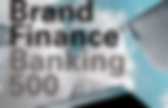

Financial system under the microscope - Economic Preview. Chappatte : Les bourses cartonnent - ©... Les scandales bancaires ne sont pas le fait de "pommes pourries" isolées - Argent & finances. U.S. Probes Bearish Euro Bets.
Taxe Tobin. WTF. Rémunérations. Banksters. Matières premières. Ponzi. Produits dérivés. Automatisation / Fast High Frequency Trading. Guerre mondiale financière. Les banques centrales fabriquent l'hyperspéculation et l'hyperinflation. Quand les marchés financiers deviennent «politiques» Europe. GlobalDebt2011shares. Financial industrial complex (Bureau d’études, 2002) BlackRock. Un article de Wikipédia, l'encyclopédie libre.
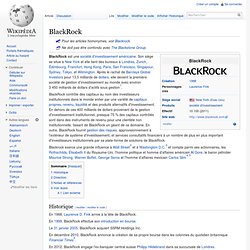
BlackRock Historique[modifier | modifier le code] En 1988, Laurence D. Fink arrive à la tête de BlackRock. En 1999, BlackRock effectue son introduction en bourse. Le 31 janvier 2005, BlackRock acquiert SSRM Holdings Inc. En décembre 2010, BlackRock annonce la création de sa propre bourse dans les colonnes du quotidien britannique Financial Times[6]. Actionnaires. Subprimes : Deutsche Bank et HSBC visés par une plainte de Blackrock et Pimco.
Six ans après l'éclatement de la bulle immobilière aux États-Unis et après la crise des subprimes, les conséquences se font encore sentir.
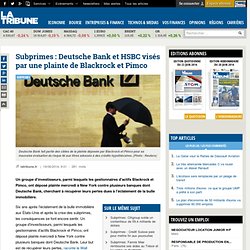
Un groupe d'investisseurs, parmi lesquels les gestionnaires d'actifs Blackrock et Pimco, ont déposé plainte mercredi à New York contre plusieurs banques dont Deutsche Bank. Leur but est de récupérer leurs pertes, raconte le Wall Street Journal. Financial industrial complex (Bureau d'études, 2002) The capitalist network that runs the world - physics-math - 19 October 2011. AS PROTESTS against financial power sweep the world this week, science may have confirmed the protesters' worst fears.

An analysis of the relationships between 43,000 transnational corporations has identified a relatively small group of companies, mainly banks, with disproportionate power over the global economy. The study's assumptions have attracted some criticism, but complex systems analysts contacted by New Scientist say it is a unique effort to untangle control in the global economy. Pushing the analysis further, they say, could help to identify ways of making global capitalism more stable.
The idea that a few bankers control a large chunk of the global economy might not seem like news to New York's Occupy Wall Street movement and protesters elsewhere (see photo). But the study, by a trio of complex systems theorists at the Swiss Federal Institute of Technology in Zurich, is the first to go beyond ideology to empirically identify such a network of power. The Zurich team can. The top 50 of the 147 superconnected companies. After Edward Snowden… are core banking systems secure ?
The power and ubiquity behind spyware The US administration – along with governments of other countries – has been using ever more sophisticated methods of data analysis, designed to defend and protect its interests and those of its citizens against foreign cyber attacks and other threats.
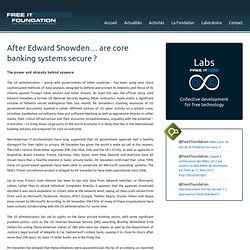
At least this was the official story, until Edward Snowden, a former US National Security Agency (NSA) contractor, made public a significant volume of hitherto secret intelligence files last month. Mr Snowden’s stunning exposure of US government documents painted a rather different picture of US cyber activity on a global scale, including clandestine surveillance, data and software hijacking as well as aggressive attacks on other states, their critical infrastructure and their economic competitiveness, arguably with the potential – in extremis – to bring down large parts of the world economy. Antonio Maria Costa, ancien directeur de l’Office des Nations Unies contre la drogue et le crime (UNODC) Vince Cable warns against reopening banks debate. Vince Cable, the business secretary, has cautioned against reopening the debate about whether to force banks to break up their high street arms from their investment banking, warning it would create "massive uncertainty".
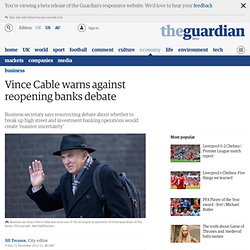
Once one of the strongest proponents of total separation of the banks to avoid the need for another taxpayer bailout, Cable said the independent commission on banking had concluded that ringfencing was the best way to make banks safer. He was responding to a report by a parliamentary commission on banking standards chaired by the Conservative MP Andrew Tyrie, which put full separation of the banks back on the agenda.
The report by Tyrie's commission said the current legislation planned to implement the ringfence fell "well short of what is required". » GEAB N°71 : Mars-juin 2013 – Débranchement de l’homme-malade du monde et dernière phase d’impact de la crise systémique globale. Je partage avec vous aujourd’hui la vision du “GlobalEurope Anticipation Bulletin”, qui est pour moi de loin une des meilleures sources d’information sur la Crise.Toujours une tonalité très “europtimiste” – je pense pour ma part qu’on va sacrément attendre les avancées sur le projet politique… Mais bon, il est indispensable en ces temps troublés de lire des visions très différentes pour s’aiguiser l’esprit… - Communiqué public GEAB N°71 (15 janvier 2013) - Jusqu’à présent le déroulement de la crise a été fidèlement décrit suivant les cinq phases identifiées par notre équipe dès mai 2006 (GEAB n°5) et complétées en février 2009 (GEAB n°32) : déclenchement, accélération, impact, décantation et dislocation géopolitique globale, les deux dernières étapes se développant simultanément.
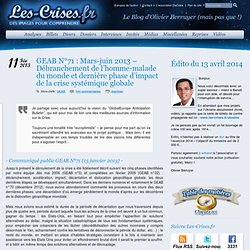
Esquiver l’impôt, ce n’est finalement que du capitalisme pour Eric Schmidt (Google) Empêtrées dans des politiques d’austérité, les démocraties européennes grincent de plus en plus des dents. La cause de cette crispation ? L’efficacité trop visible des pratiques d’optimisation fiscale des entreprises américaines du Web - qui ne sont cependant pas les seules pratiquantes. Parmi ces dernières : Google. Bloomberg révélait récemment les près de 10 milliards de dollars de revenus transférés par Google vers une de ses filiales basées aux Bermudes, un paradis fiscal.
Taibbi: After Laundering $800M in Drug Money, How Did HSBC Executives Avoid Jail? The Biggest Price-Fixing Scandal Ever. Conspiracy theorists of the world, believers in the hidden hands of the Rothschilds and the Masons and the Illuminati, we skeptics owe you an apology.
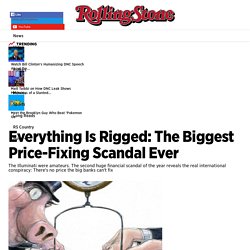
You were right. The players may be a little different, but your basic premise is correct: The world is a rigged game. We found this out in recent months, when a series of related corruption stories spilled out of the financial sector, suggesting the world's largest banks may be fixing the prices of, well, just about everything. You may have heard of the Libor scandal, in which at least three – and perhaps as many as 16 – of the name-brand too-big-to-fail banks have been manipulating global interest rates, in the process messing around with the prices of upward of $500 trillion (that's trillion, with a "t") worth of financial instruments.
That was bad enough, but now Libor may have a twin brother. The Scam Wall Street Learned From the Mafia. The Biggest Price-Fixing Scandal Ever. Matt Taibbi Talks About Criminalized Poverty and Why Wall Street Is Above the Law. Matt Taibbi.
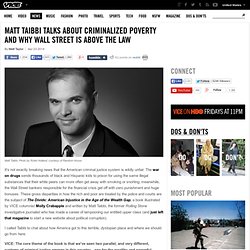
Photo by Robin Holland, courtesy of Random House It's not exactly breaking news that the American criminal justice system is wildly unfair. The war on drugs sends thousands of black and Hispanic kids to prison for using the same illegal substances that their white peers can more often get away with smoking or snorting; meanwhile, the Wall Street bankers responsible for the financial crisis get off with zero punishment and huge bonuses. These gross disparities in how the rich and poor are treated by the police and courts are the subject of The Divide: American Injustice in the Age of the Wealth Gap, a book illustrated by VICE columnist Molly Crabapple and written by Matt Taibbi, the former Rolling Stone investigative journalist who has made a career of lampooning our entitled upper class (and just left that magazine to start a new website about political corruption).
Broadly speaking, how does the justice system treat you when you don't have money? BIS - BRI (Banque des Règlements Internationaux) Les 7 péchés capitaux des banques / Accueil. Banques et autres acteurs, argent (sale) et paradis fiscaux.
Davos. Banques centrales. "Offshore Leaks" Finance. Philippe Béchade - 30 janvier - BFM : Intégrale Placements. Blowback.